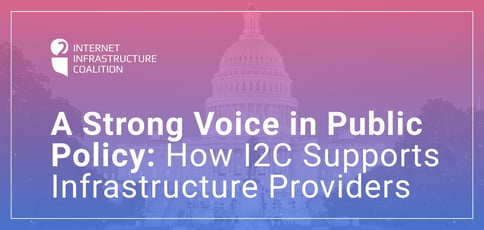
TL; DR: The Internet Infrastructure Coalition (i2Coalition) protects the interests of those who build the web’s infrastructure by advocating for a positive legislative environment. The association, founded in 2012, covers a broad range of issues, including intermediary liability, privacy and encryption, and data access. i2Coalition is focused on leveraging Section 230 of the U.S. Communications Decency Act to preserve protections that are essential to internet innovation.
The legislative and regulatory landscape is abuzz with developments in digital privacy, net neutrality, and online copyright protection. But problems occur when key stakeholders are left out of the conversation — and are therefore unable to warn legislators of the unintended consequences of their actions.
Politicians have historically overlooked the internet’s infrastructure sector in this respect. Fortunately, groups like the Internet Infrastructure Coalition (i2Coalition) are working to change that.
“Legislators looking to solve problems on the internet aren’t trying to harm the infrastructure industry — they simply don’t know we exist,” said Christian Dawson, Executive Director of the i2Coalition. “Somebody needs to be there explaining important issues to legislators and regulators so they don’t cause major problems with the way that the internet’s infrastructure works.”
The i2Coalition has become the voice for those who build the infrastructure of the internet. Members include datacenter operators, hosting companies, MSPs, domain registrars, and infrastructure providers. In many cases, the i2Coalition also serves to protect small businesses in an ever-consolidating industry.

In advocating for a fair legislative environment, the association spans a range of important issues, including data access, intermediary liability, and privacy and encryption. The i2Coalition’s recent focus on Section 230 of the U.S. Communications Decency Act, for example, aims to preserve protections that support internet innovation.
i2Coalition offers multiple member benefits in addition to fostering continued growth in the infrastructure sector. Perks include monthly working group meetings, opportunities to meet with Congressional members, and exclusive member-to-member offers.
A Grassroots Effort Formed to Thwart Threats to the Hosting Industry
The i2Coalition was launched by a grassroots group of small-business executives in 2012 amid persistent threats to the hosting industry.
“I was one of the co-founders of the organization along with a lawyer, David Snead,” Christian said. “We were responding to a piece of legislation in the United States known as PROTECT IP Act (PIPA) and its sister legislation in the Senate — the Stop Online Piracy Act (SOPA).”
Both bills were poised to shift the way intermediary liability was defined in the online space.
“In an attempt to address piracy online, they were going to put the responsibility of policing content on providers of hosting and data storage services,” Christian said. “This was in direct contradiction of the environment in which the internet was created. It’s not like a newspaper, where an editor decides to publish certain information and accepts liability as to whether it is factual. It’s an environment where you’re providing a service.”
In such an environment, Christian said, a small business could become a web hosting company. Even without infrastructure or staff, a sole proprietor with a reseller account could start a lucrative business. But legislation casting legal responsibility on these entrepreneurs would make it almost impossible for them to survive.
With the exception of major players like Google, no one was stepping up — or representing the small business space.
“So we pulled together 200 or so CEOs of small web hosting businesses to write letters and had a handful of them march up to Capitol Hill and to say to congressmen and senators, ‘This is going to kill our business,’” Christian said.
The grassroots group, then known as the Save Hosting Coalition, convinced Senator Jerry Moran from Kansas to join the hold that Senator Ron Wyden of Oregan had placed on PIPA.
“The bipartisan hold allowed us time to coordinate with an entire internet community to fight PIPA and SOPA, ensuring the voices of small hosting businesses were heard,” Christian said. “And PIPA and SOFA went down in flames.”
Privacy and Encryption, Data Accessibility, and Digital Trade Initiatives
Four major companies — Rackspace, cPanel, Softlayer, and Endurance — came together after the demise of PIPA and SOFA to join the grassroots group, and i2Coalition was born.
The group launched with 38 original member companies; now that count has reached 110. And its goal is to provide education and advocacy to legislators and regulators, not just in the U.S. but throughout North America and Europe.
“We’ve developed sufficient infrastructure, resources, and expertise to provide a voice for the people who run companies in the internet stack that sits above the telco layer and below the content layer,” Christian said. “They’re the people that rack and stack servers and datacenters all day long. And most people don’t know they exist.”

Today, the i2Coalition addresses more than just intermediary liability. Privacy, encryption data access, digital trade, and internet governance are all on the menu.
“For example, we’ve done a lot with encryption and government access to data,” Christian said. “Legislators don’t understand the need for strong encryption, or that we can’t just give the good guys the keys to access data that they want because the bad guys will be able to get their hands on those keys, too.”
The association also supports specific interests through member working groups, such as the Public Policy Working Group, the ICANN Committee, and the Diversity and Inclusion Initiative.
“We reached a point where we had enough leaders focusing on specific issues that we could give them special groups,” Christian said. “We also started a working group based on bringing more diversity to tech. And that’s been fulfilling.”
An Immediate Priority: Addressing Section 230
Ultimately, the i2Coalition’s goal is to knock down barriers to infrastructure growth, ensuring the internet continues to survive and thrive. The most recent barrier is Section 230 of the U.S. Communications Decency Act, which according to the i2Coalition, “establishes a framework where those responsible for content are liable for their actions, rather than imposing liability on third-party providers
The association advocates for the type of intermediary liability protection principles outlined in Section 230.
“The conversation is focused on what the responsibilities of platforms like Facebook and Twitter should be,” Christian said. “But it’s problematic to the extent that there’s essentially one law that deals with all of that — so actions intended to affect Facebook and Twitter affect all of us.”
Christian isn’t merely referring to internet infrastructure in this case — he’s focused on the entire digital economy. “We collaborated with library and educational associations, both of which are called out specifically in Section 230, on a webinar designed to enlighten viewers.”
Section 230 also has the potential to help with spam mitigation.
“Ultimately, 230 is an area where if you are providing some sort of a decision point on content, you still get intermediary protections, and you’re not considered the publisher,” Christian said. “That directly relates to spam filtering. Without Section 230, someone could say, ‘I had a job offer, and I missed it because it went into my spam filter. Now I’m going to sue you.’”
Moving forward, the i2Coalition will continue to advocate for the industry by serving as a steady presence in the fast-moving regulatory environment. And Christian says the association will never veer from its small business focus.
“I’m a small business guy at heart,” he said. “So as executive director, I make sure that I’m creating an organization that the small business owner would be proud of.”
HostingAdvice.com is a free online resource that offers valuable content and comparison services to users. To keep this resource 100% free, we receive compensation from many of the offers listed on the site. Along with key review factors, this compensation may impact how and where products appear across the site (including, for example, the order in which they appear). HostingAdvice.com does not include the entire universe of available offers. Editorial opinions expressed on the site are strictly our own and are not provided, endorsed, or approved by advertisers.
Our site is committed to publishing independent, accurate content guided by strict editorial guidelines. Before articles and reviews are published on our site, they undergo a thorough review process performed by a team of independent editors and subject-matter experts to ensure the content’s accuracy, timeliness, and impartiality. Our editorial team is separate and independent of our site’s advertisers, and the opinions they express on our site are their own. To read more about our team members and their editorial backgrounds, please visit our site’s About page.

